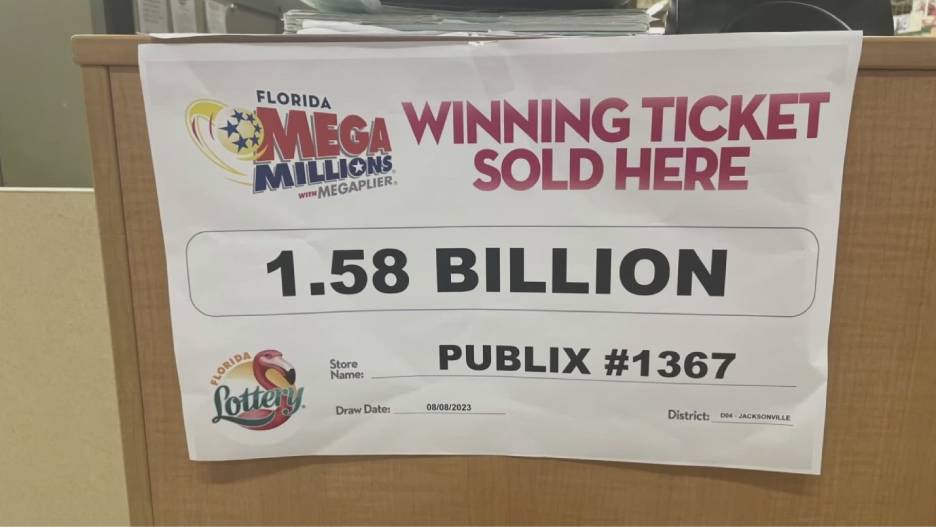Sudden-wealth expert Robert Pagliarini has some news one person can use.
In the last few years, California had its first billionaire lottery winner. The state’s lottery confirmed that a gas station in Los Angeles County sold that night’s only winning Powerball ticket, meaning someone out there is free to claim the draw’s record $2 billion prize. (Powerball is an interstate game run by the Multi-State Lottery Association.)
The new Powerball billionaire, as I’m calling this unknown person (though their final take-home prize may be somewhat less than that), is entering an experiment in instant, no-warning wealth accumulation with little precedent.
Other instances of sudden wealth tend to not be anywhere near this amount, and, additionally, most others who come into such life-changing sums at least somewhat expected it—as is often the case with inheritance—and maybe even had time to plan for how to handle that kind of ultra-wealth.
And ultra-wealth it is. “It’s sick,” Robert Pagliarini, a wealth adviser and the author of the book The Sudden Wealth Solution, told me. “It’s ridiculous levels of wealth.”
To illustrate, Pagliarini broke it down for me: If the winner took the earnings as a lump sum, which is significantly lower than the advertised $2 billion, the after-tax amount would be about $600 million.
If they then invested it in something low risk, like Treasury bonds, the interest alone could amount to more than a million a month—for the rest of their life. And that income would be available without even touching the prize money itself.
I caught up with Pagliarini to discuss what the Powerball billionaire may face in the days ahead, and why he believes the biggest challenges to come are psychological.
Caroline Mimbs Nyce: How unprecedented is it to become a billionaire overnight?
Robert Pagliarini: It is unprecedented. I mean, this is the largest lottery jackpot that we’ve seen. So in terms of windfalls, yeah, this is pretty crazy. If this person called me and became my client, this would be the largest overnight windfall that I’ve ever dealt with.
There are certainly very wealthy families where the kids inherit billions of dollars. But if someone’s worth billions of dollars and they have an estate that they’ve left, there are really smart tax and legal structures set in place. And usually, with these trusts, there are certain parameters of what you can and can’t do with the money. And there’s a whole team of people around them that they can go to and ask questions.
We know people that have sold businesses for well north of $2 billion. But they were probably the founder, the CEO. They’ve got the CFO on board. They’ve got tax people and legal people. They’ve got a whole team around them.
I was going to say that the only other parallel would be maybe a sports contract. But then I thought, Well, yeah, but not at this level. No one’s signing a $2 billion contract. So I would say this is absolutely unprecedented. I can’t think of another source of sudden wealth that’s $2 billion like this—that happens simply because you went in for a Slurpee and you happened to buy a ticket.
Nyce: I can imagine that would be a somewhat bewildering experience.
Pagliarini: I tell people that, with sudden wealth, especially a lottery, there are two emotions after you win. And the first is this sense of joy and excitement and jubilation. But that is quickly followed by this sense of, Oh my God, I don’t know what I’m doing. There might be this sense of fear of like, I’m going to screw this up; I’m going to lose it all. It can be very overwhelming.
Nyce: Have you worked with lottery winners before?
Pagliarini: I have. Honestly, the success of managing sudden wealth, especially when it comes to a lottery, it’s like 99 percent psychological and 1 percent financial. Because on the financial side, although the numbers can be very big, there’s really some very, very simple decisions that you have to make. From a financial perspective, it’s very straightforward: It’s lump sum or annuity? And then you have to pay taxes.
Nyce: How do you typically advise people on lump sum versus annuity?
Pagliarini: I’ve been a big proponent of taking the annuity for years. What the annuity gets you that the lump sum does not is the ability to make mistakes and to recover from them. If you get the lump sum and you invest in bad investments or you give the money away too freely, or you just spend it too lavishly on different things, you don’t get another shot at it. Game over. The advantage with the annuity is that you can do that in the first year, and the next year you get another deposit into your bank account. And then you can screw up again that second year and the third year and the fourth year you can continue to make mistakes, but every year you get a do-over. I’m hopeful that by year eight or nine, you finally get it together.
Pagliarini: It depends on the form of sudden wealth. If it’s a business sale, the person is not going to change. If it’s a lawsuit settlement or inheritance, oftentimes the person themselves doesn’t change that much.
What’s really interesting—and it doesn’t happen all the time, but it happens enough—is that the people around them will change as a result of this windfall. And that’s where things get really sticky.
You may have heard of the lottery curse. Some people who have won will tell you months or years later that they wish they never would have. A lot of them—not all of them—feel like the lottery win was the worst thing that happened to them. And the reason most of them will say that is because it changes their relationships, whether it’s with their spouse, their family, their kids, or their friends. And when that happens, it really destroys people. Because one day, you’ve got a significant other and family and friends, and everything’s fine. And then you get all of this money and it starts to put pressure on those relationships. People are asking you for favors and for loans. Can you imagine losing your friendships or not being able to trust those friendships anymore?
Nyce: What do you think that says about us as a society?
Pagliarini: I think we go into it thinking that lottery money is going to solve all of our problems. And it just doesn’t. Listen, I love money. I think money is amazing. I think it can do a lot of things. It provides flexibility and freedom. It allows us to maybe quit a job where we have an abusive boss or to provide food and health care to our family. At the same time, you can’t look to it to fix relationships or to fix a bad marriage or to provide fulfillment or meaning.
When you have this level of wealth, you don’t have to do anything. And that’s a problem because we as humans are not built to just sit around and do nothing. That is a recipe for depression.
When you have $600 million in the bank account, all of a sudden you have to ask some really deep questions like, Okay, now that I don’t have to work, how do I want to spend my days? How do I want to spend my life? Those are really hard questions to answer, and it can take time.
Nyce: If you had the winning ticket, would you trust yourself to take the lump sum?When you have $600 million in the bank account, all of a sudden you have to ask some really deep questions like, Okay, now that I don’t have to work, how do I want to spend my days? How do I want to spend my life? Those are really hard questions to answer, and it can take time.
Pagliarini: One hundred percent. I would definitely trust myself to take the lump sum. There are people who should take the lump sum. But for most people, I think the annuity is a lot better and easier. I even created, for the fun of it, this “lump sum or annuity?” questionnaire that tells you which one you should do.
Nyce: What are the questions on it?
Pagliarini: The questions are: How old are you? The younger you are, the better off if you take the annuity. Are you in debt right now? If you’re in debt or have credit cards and other things piling up, maybe you haven’t made the best financial decisions before, so annuity is better. Have you ever been convicted of a crime? Do you have a substance-abuse issue? Have you invested before? Do you have investments right now? Do you work with tax or insurance people now? How sophisticated are you financially? Do you have family or friends that you’re concerned might come after you and want lots of loans and investments? All these different criteria will point you in one direction or the other.
Nyce: What would you say to a client who said, “Wait, so you can take the lump sum, but I can’t? Why do you trust yourself and not me?”
Pagliarini: I would point them to the questionnaire and I would say, “Here, take the quiz, and what does it tell you?” And then I would take the quiz.
I would just say that there are no absolutes. I think we’re just dealing in terms of probabilities—what is safer to do and what makes the most sense. And listen, I think most people take the lump sum. So regardless of my dumb little questionnaire—even if it said, “You absolutely should take the annuity, please, for the love of God, don’t take the lump sum”—they’re still going to do it.
You can totally be successful taking the lump sum. We just want to make sure that you’ve got a team in place and that we have certain safeguards and a safety net set up.
Nyce: Is there anything else you think is really important to this story?
Pagliarini: Going back to the psychology, there’s a difference between earned wealth and sudden wealth. Earned wealth, that’s what you and I do every single day. We get up; we work. When we get our paycheck, we know what went into that—the sacrifice, the long hours, the getting up early, the late night. And so because of that, we’re probably a little bit more frugal with that money. We don’t just want to blow it, because we know we had to work our ass off in order to get it to earn it.
Nyce: Do people get imposter syndrome for luck-driven wealth.
Pagliarini: For sure. It’s the, Why me? And then it’s the, Well, I feel guilty because I got all this money, and my friends and family don’t have it. That can really mess with your mind. Do I try to find new friends or do I give money to my friends who don’t have as much as I do? It’s a bit of a spiral when you try to figure out how to navigate this new paradigm with your existing relationships.
Nyce: Say you were hired by the lottery winner. What would be the first thing you would say to them?
Pagliarini: Sign the ticket. Take a photo with it. Take a video with it. Tell one trusted person. Don’t tell anyone else. And let’s keep that secure and safe.
Sometimes you hear about these lottery winners who claim the prize four or five or six months later. In my mind, that is pure insanity. Can you imagine holding a ticket that’s worth $2 billion and waiting a few months to cash it in? I couldn’t sleep at night. I would be crazed thinking about it.
If it was someone that I was advising, I would say, let’s get the tax person and get the legal person lined up. Let’s figure out whether the lump sum or annuity makes sense—not a hard decision. And then let’s collect.







